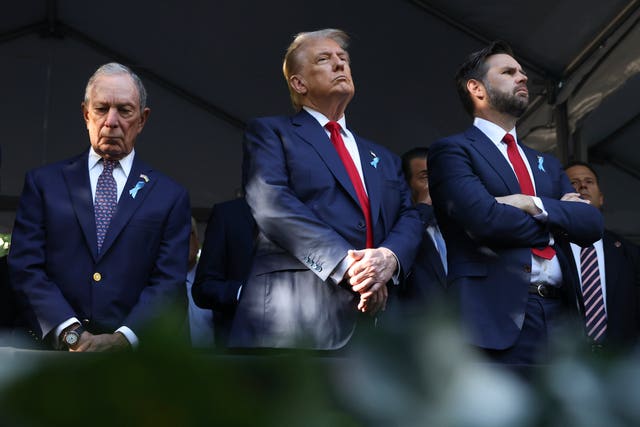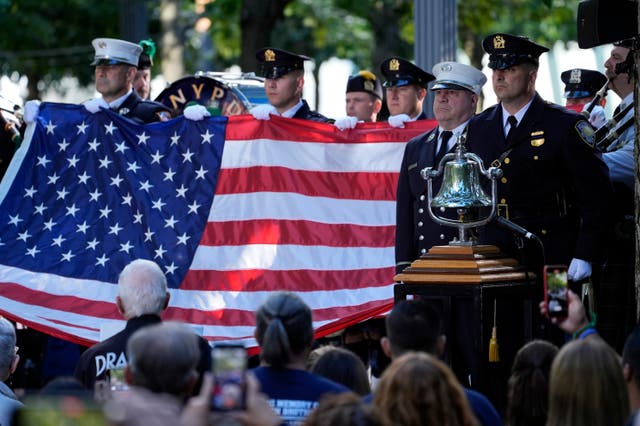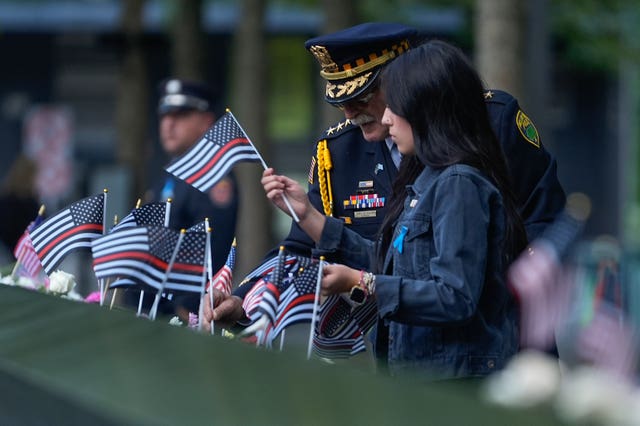US commemorates 9/11 attacks with victims in focus – and politics in view
The date marks the day nearly 3,000 people died in attacks which brought down the twin towers at the World Trade Centre in New York.

The US is remembering the lives taken and those reshaped by 9/11, marking an anniversary laced with presidential campaign politics as President Joe Biden, former president Donald Trump and vice president Kamala Harris stood together in the plaza where the twin towers once stood.
September 11 – the date when hijacked plane attacks killed nearly 3,000 people in 2001 – falls in the thick of the presidential election season every four years, and it comes at an especially pointed moment this time.
Fresh off their first-ever debate on Tuesday night, Ms Harris and Mr Trump met again at the 9/11 observances at the World Trade Centre in New York and the Flight 93 National Memorial in Pennsylvania.
Mr Trump and running mate JD Vance arrived at the trade centre site at around 8am and posed for photographs with some in the audience. Ms Harris arrived with Biden about a half-hour later, to cheers of “Kamala!” from some audience members.
Mr Biden and Mr Trump shook hands, and former New York Mayor Michael Bloomberg appeared to facilitate a handshake between Ms Harris and Mr Trump. Then the Democratic and Republican nominees stood only a few feet apart, with Mr Biden and Mr Bloomberg between them.
The ceremony then began with the tolling of a bell and a moment of silence.

The political background was not the chief concern of victims’ relatives such as Cathy Naughton, who came to honour her cousin Michael Roberts, one of hundreds of firefighters killed in the attack.
Twenty-three years later, “it’s just so raw,” she said. “We want to make sure people remember always, and say the names always and never forget.
“Every year, it just doesn’t get easier.”
Regardless of the campaign calendar, organisers of anniversary ceremonies have long taken pains to try to keep the focus on victims.

For years, politicians have been only observers at ground zero observances, with the microphone going instead to relatives who read victims’ names aloud.
If politicians “care about what’s actually going on, great. Be here,” said Korryn Bishop, who lost her cousin John F McDowell Jr. “If they’re just here for political clout, that upsets me”.
Mr Biden, on the last September 11 of his term and likely his half-century political career, was headed with Ms Harris later to ceremonies in Pennsylvania and at the Pentagon, the three sites where commercial jets crashed after al-Qaida operatives took them over on September 11 2001.
Mr Trump also was due at the Flight 93 National Memorial near rural Shanksville, Pennsylvania.
Officials later concluded that the aircraft that crashed there was headed toward Washington. It went down after crew members and passengers tried to wrest control from the hijackers.

The attacks killed 2,977 people and left thousands of bereaved relatives and scarred survivors. The planes carved a gash in the Pentagon, the US military headquarters, and brought down the trade centre’s twin towers, which were among the world’s tallest buildings.
The catastrophe also altered US foreign policy, domestic security practices and the mindset of many Americans who had not previously felt vulnerable to attacks by foreign extremists.
Effects rippled around the world and through generations as the US responded by leading a “Global War on Terrorism,” which included invasions of Afghanistan and Iraq.
Those operations killed hundreds of thousands of Afghans and Iraqis and thousands of American troops, and Afghanistan became the site of the United States’ longest war.
As the complex legacy of 9/11 continues to evolve, communities around the country have developed remembrance traditions that range from laying wreaths to displaying flags, from marches to police radio messages.
Volunteer projects also mark the anniversary, which US congress has titled both Patriot Day and a National Day of Service and Remembrance.





